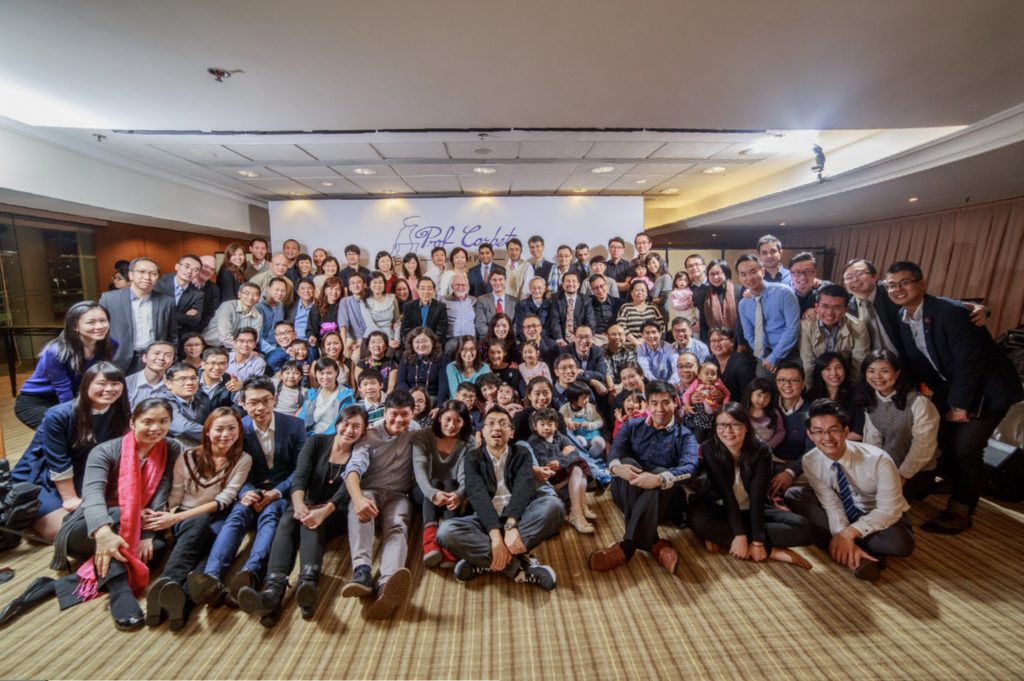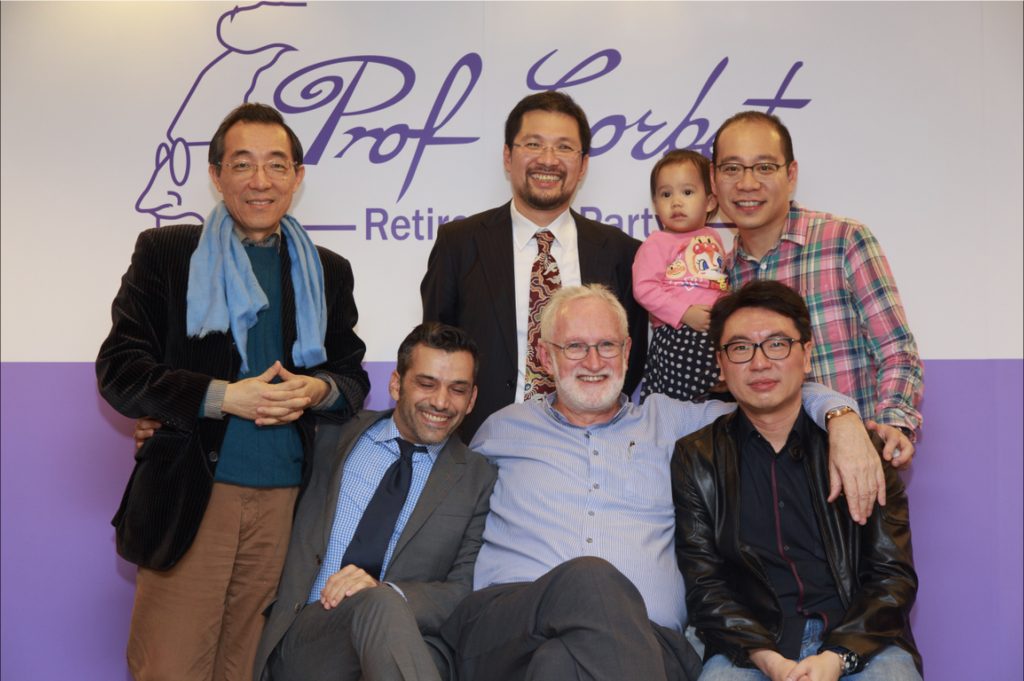Esmonde Corbet
29 March 2022I, Esmonde Corbet, attended St. Conleth’s College from 1960 to 1970. I have lived in Hong Kong since 1980, and while Hong Kong is not the happy place it once was, I hope to continue living here. I do pay rates on the apartment I own, which are modest, but having no salary, no rental income and no business, I pay no tax whatsoever, and I have medical cover through my former employer. My apartment in Hong Kong, built in the 1960s, comes with what is described as “a servant’s quarters” – a dedicated bedroom and separate toilet/shower – thus facilitating me in employing, as many of us here in Hong Kong do, a full-time, live-in domestic helper, an amenity which, and my life experience has formed this irrevocable opinion, befits a self-respecting Conlethian in my situation. Further, I feel fully rooted in this community, my conversational Cantonese being far, far, far better than ever achieved in St. Conleth’s with my Oral Irish, despite the efforts of Sean Quinlan.


I have been invited to compose this piece, and one of the topics suggested was “My Favourite Memory from St. Conleth’s”. After long deliberation, I have decided on this. Along with two other classmates, I took French for my Leaving Cert in Fifth Year (in those days not all Leaving Cert subjects had to be taken at the one sitting to count for University Admission), as this freed me in my final year at St. Conleth’s from having to face a Breton Nationalist, described in a headline of the Irish Independent on the 15th of June 2013 as a “Nazi Collaborator”. That Feutren-free year is my favourite memory from St. Conleth’s.
I entered UCD to study Dentistry in 1970. While in Pre-Dent, as it was then called, and being part of a large class including Pre-Med and Pre-Vet students in Belfield, I came to the realisation that St. Conleth’s had allowed many of us to emerge, whether by design or neglect, reasonably true to our inner selves, and we had not been bludgeoned into a conformity apparent in the graduates of other Southside Dublin Catholic Boys’ Secondary Schools with whom I interacted in UCD. For this I remain genuinely and truly grateful to St. Conleth’s.
Further, it seemed to me that through what was held to be the education of “the sons of Catholic Gentlemen”, though delivered in part by some who were not always overtly gentlemanly themselves, we Conlethians of my day, who had not succumbed through weakness, or to the forces of darkness and evil, displayed a streak of grit and determination not noted by me in school-leavers from other boys’ secondary schools of that time. In Pre-Dent I also discovered that the grounding at Conleth’s in Physics by Michael Manning and in Chemistry by Jim O’Connor outshone that of most of my UCD confreres, none of whom incidentally had been to Conleth’s, such that I was awarded a not ungenerous cash prize, among the first such prizes awarded by UCD in Decimal Currency following “Decimal Day” on the 15th of February 1971, and thus not denominated, as formerly, in Guineas, or in Pounds, Shillings and Pence.
After graduating from UCD in December 1975, I was extremely fortunate to secure a position in the Royal Dental Hospital of London. There, in early 1976, I discovered that the undergraduate education and training at the (then) Dublin Dental Hospital was in no way inferior to that delivered in the London dental schools, despite the, long-since remedied, difficulties faced by all staff and dental students in Dublin at that time. I further realised that Michael Gardiner’s English language teaching at Conleth’s had left me with a richer vocabulary and better parsing and syntactical skills than displayed by my professional colleagues who had gone through British secondary schooling; my approach to English composition being hampered only by an undying attraction to the construction of complex sentences, a Gardiner legacy, as is evident in this piece, and which was the bane of many editors of my professional submissions.

In London, I embarked upon a training pathway to become an NHS Consultant in Dentistry, but after a couple of years, acquiring requisite professional qualifications along the way, I side-stepped into Dental Academia at the Royal Dental Hospital School of Dental Surgery of the University of London, which was situated on Leicester Square, a prime location in the West End of London. All staff knew that the School’s days there were numbered, as the site was far too valuable to be occupied by a dental hospital and school. I served many long hours on a committee tasked with trying to relocate to St. George’s Hospital, Tooting, in South-West London, which was part of the same hospital group, only for the Area Health Authority to reject the proposals outright. Around that time, it became known that The University of Hong Kong was establishing a dental school. Feeling dejected over the prospects for the Royal Dental Hospital of London, I applied to join Dental Studies at The University of Hong Kong as a founding staff member, which I did in August 1980. This allowed me to contribute to the design of the dental curriculum and the structure of its delivery from the ‘get go’.

It was the first ethnically Chinese Vice-Chancellor of The University of Hong Kong, Rayson Huang, who was instrumental in establishing dental education at the University. When he died in 2015, contributions from former and serving staff were invited to commemorate him. I wrote that hardly a day had passed between my coming to Hong Kong until his death on which I did not offer, in my thoughts, my sincere thanks to him for having allowed, through his foresight, me to enjoy a hugely rewarding academic career here. The editor of the commemorative collection contacted me to say that she was of a mind to redact that part of my contribution – because it was not plausible. “But it is absolutely true”, I protested.

After nearly 36 years at The University of Hong Kong, I ended my career as the Senior Professor in Periodontology of the Faculty of Dentistry, which was then ranked by Quacquarelli Symonds (QS) World University Rankings, by Subject, as the Number One Dental School in the World, a ranking the Faculty held for three successive years, a collective accomplishment. I have been asked to nominate for this piece my proudest achievement. That would be the facilitation of learning by over 2000 dentists about Periodontal Diseases and their prevention and management, along with the education and training of postgraduates, including 44 Specialist Periodontists, who support the dental profession through offering appropriate specialist care and by contributing to education in the field.
As a long-term Faculty Admissions Tutor and member of the University Admissions Committee, who over the years interviewed well over a thousand, and possibly thousands of, secondary-school-going university applicants, I have come to the conclusion that school is something which most of us just have to survive, but which maybe provides opportunities to establish long-term friendships and be the stuff of memories. However, I am firmly of the opinion that St. Conleth’s College, wittingly or unwittingly, offered me some added value to the school experience in that I left school with the conviction that I could march to the beat of my own drum.